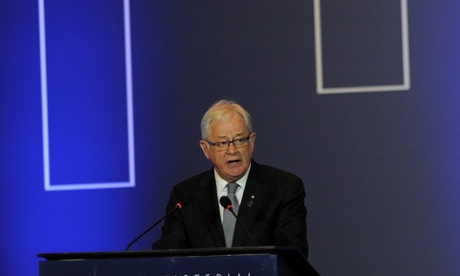Trans-Pacific Partnership taking shape behind closed doors, Andrew Robb says
Australia’s trade minister says the free trade deal should be concluded by the year’s end

The trade minister, Andrew Robb, says the Trans-Pacific Partnership
(TPP) free trade agreement is starting to take shape and should be
concluded by year’s end.
The deal would send a signal about the importance of the Asia-Pacific region, especially during a time of economic and geopolitical instability, Robb told ministers from 12 nations involved in negotiating the pact in Sydney on Saturday.
The deal is set to cover 40% of the global economy.
“We are trying to make as many final decisions as we can and bring this thing to conclusion,” Robb told counterparts including those from the US, Malaysia, Canada, Japan and New Zealand.
Despite the progress, the secretive negotiations involved in the process have attracted criticism for being closed off from public view.
Critics worry the deal will mean the cost of medicine skyrockets and put freedom of speech at risk through onerous copyright laws.
A small group of protesters gathered outside the TPP meeting at Sydney’s Sheraton on the Park, rejecting assurances from the government that the deal would be positive and transformative for the region.
Protester Vivien Nguyen said leaks had made her fearful the negotiations were not in the interest of Australians.
“This deal would give all the power to corporations and reduce government’s ability to legislate in our public interest,” she said. “The text we’ve seen through leaks hasn’t been reflected through assurances.”
The trade deal has been negotiated largely in secret since talks started in 2008.
Doctor’s Without Borders (MSF) has accused the US of attacking access to life-saving medicines via its push for pharmaceutical companies to have longer monopolies over brand-name drugs as part of the TPP. MSF says it will make it harder for generic companies to produce cheaper drugs.
Earlier, Robb dismissed fears the price of medicine would go up. “Those who are opposed to this scheme for all sorts of reasons are peddling a lot of misinformation, saying pharmacy costs will go up,” he told ABC Radio. “This is not the intention or the outcome that will occur with this particular 21st century agreement.”
The deal would send a signal about the importance of the Asia-Pacific region, especially during a time of economic and geopolitical instability, Robb told ministers from 12 nations involved in negotiating the pact in Sydney on Saturday.
The deal is set to cover 40% of the global economy.
“We are trying to make as many final decisions as we can and bring this thing to conclusion,” Robb told counterparts including those from the US, Malaysia, Canada, Japan and New Zealand.
Despite the progress, the secretive negotiations involved in the process have attracted criticism for being closed off from public view.
Critics worry the deal will mean the cost of medicine skyrockets and put freedom of speech at risk through onerous copyright laws.
A small group of protesters gathered outside the TPP meeting at Sydney’s Sheraton on the Park, rejecting assurances from the government that the deal would be positive and transformative for the region.
Protester Vivien Nguyen said leaks had made her fearful the negotiations were not in the interest of Australians.
“This deal would give all the power to corporations and reduce government’s ability to legislate in our public interest,” she said. “The text we’ve seen through leaks hasn’t been reflected through assurances.”
The trade deal has been negotiated largely in secret since talks started in 2008.
Doctor’s Without Borders (MSF) has accused the US of attacking access to life-saving medicines via its push for pharmaceutical companies to have longer monopolies over brand-name drugs as part of the TPP. MSF says it will make it harder for generic companies to produce cheaper drugs.
Earlier, Robb dismissed fears the price of medicine would go up. “Those who are opposed to this scheme for all sorts of reasons are peddling a lot of misinformation, saying pharmacy costs will go up,” he told ABC Radio. “This is not the intention or the outcome that will occur with this particular 21st century agreement.”
No comments:
Post a Comment